We’ve been there in the wine aisle, searching for a bottle of wine to pair with a special meal or take to a gathering with friends. We must say: Sometimes our choice has boiled down to which bottle had the prettiest label or one that appeared to be “better” or was over in the organic wine section. While food and nutrition are our expertise, we are admittedly less versed in the school of wine.
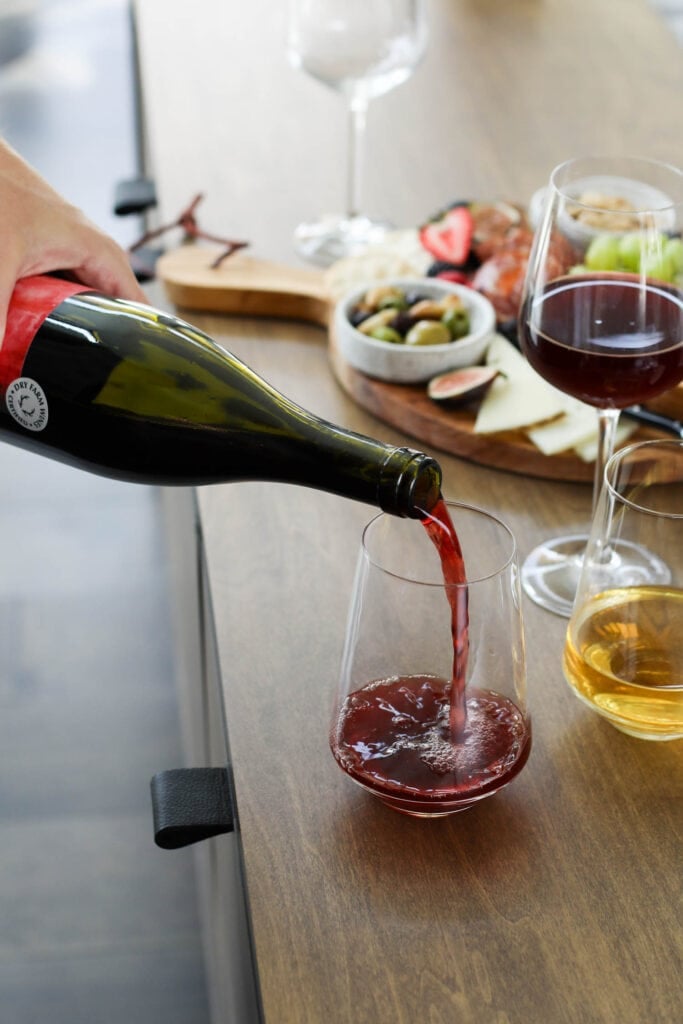
That’s why, as curious registered dietitians who enjoy an occasional glass of wine, we wanted to learn a lot more about it, especially after hearing some of the dirty secrets of the wine industry. We immersed ourselves in learning more about wine, how it’s grown, which wines are truly better and healthier choices, and wines we would feel proud to serve and gift to others. Our search led us to Dry Farm Wines, of which we have been truly impressed by their values, standards, growers, and winemaking criteria. The company sent us each a box to try so we could taste it and learn more about how their service works. In this post, we’ll share with you what we learned and how Dry Farm Wines is different from other wines out there.
We also want to say: If you don’t drink wine or don’t drink alcohol, we’re not encouraging you to start. Abstinence can be of great value in anyone’s health journey and a tool we have used and advocated for ourselves. If you are like us, though, and want to learn about some better wine choices that are available, this post may be of interest to you.
This post was created in partnership with Dry Farm Wines.
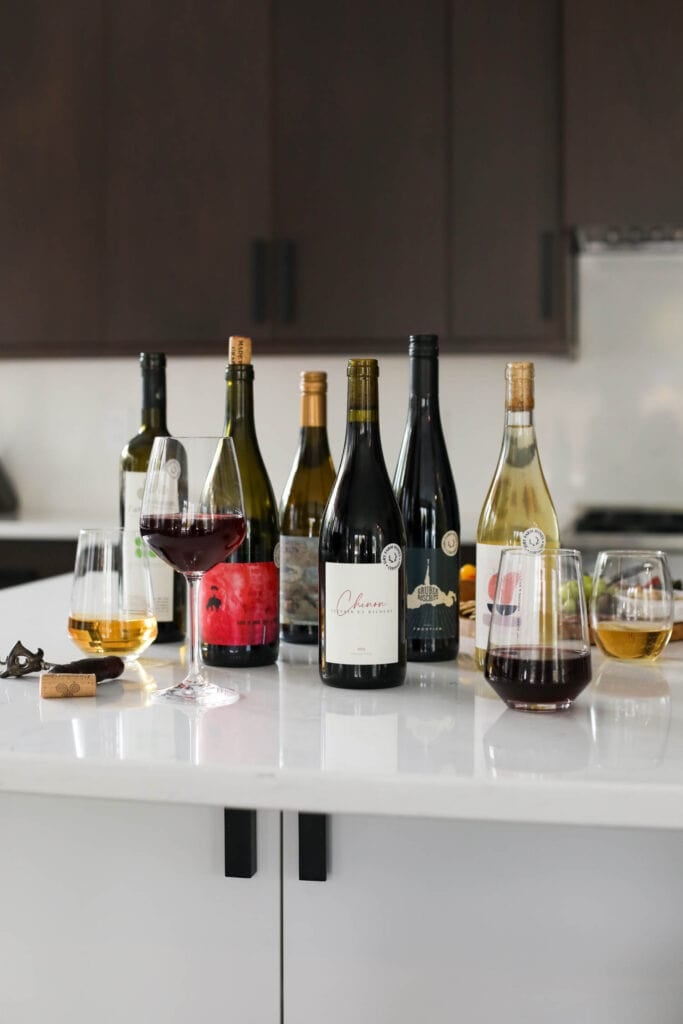
What Is Dry Farming?
First, it’s important to know that “dry farm wine” is both a noun and a proper name. Dry farming is a term used to describe farms that don’t use artificial irrigation and precious water sourced from elsewhere to grow their crops. Therefore, whether it’s crops, grape vines, or vegetables being grown, dry farming does not rely on using imported water and irrigation resources (literally millions of gallons of water are saved). This is especially beneficial and impactful in areas of the world where water is less prominent and irrigation requires a lot of inputs, such as in California and other dry climates. On a dry farm, rather than requiring artificial irrigation, the soil’s residual moisture from the rainy seasons are captured and reused during the drier months. For dry farming wine, specifically, the roots of the vines are trained to grow deep to find a natural water source.
And What Is Dry Farm Wines?
Dry Farm Wines is a company that meticulously sources wines that are organically grown on small family farms where the dry farming process (see above) is used. Based on research, Dry Farm Wines estimates that their growers save roughly 700 million gallons of water annually by using the dry farming method. These wines come from all over the world, including many countries in Europe, and must meet strict criteria.
So you see, Dry Farm Wines is not a single vineyard or winery, but rather a service that curates the best available wines from around the world and ships them right to your door, both as a one-time option and as a membership. Our experience, after tasting mixed wines from a complimentary box, was that the wines are lighter and brighter than what we had experienced before. Many of them are blends we had never heard of, which were fun to try. And even the more well-known varieties, like Chardonnay and Cabernet Sauvignon, tasted more vibrant and natural without the higher sugar and alcohol content they typically come with.
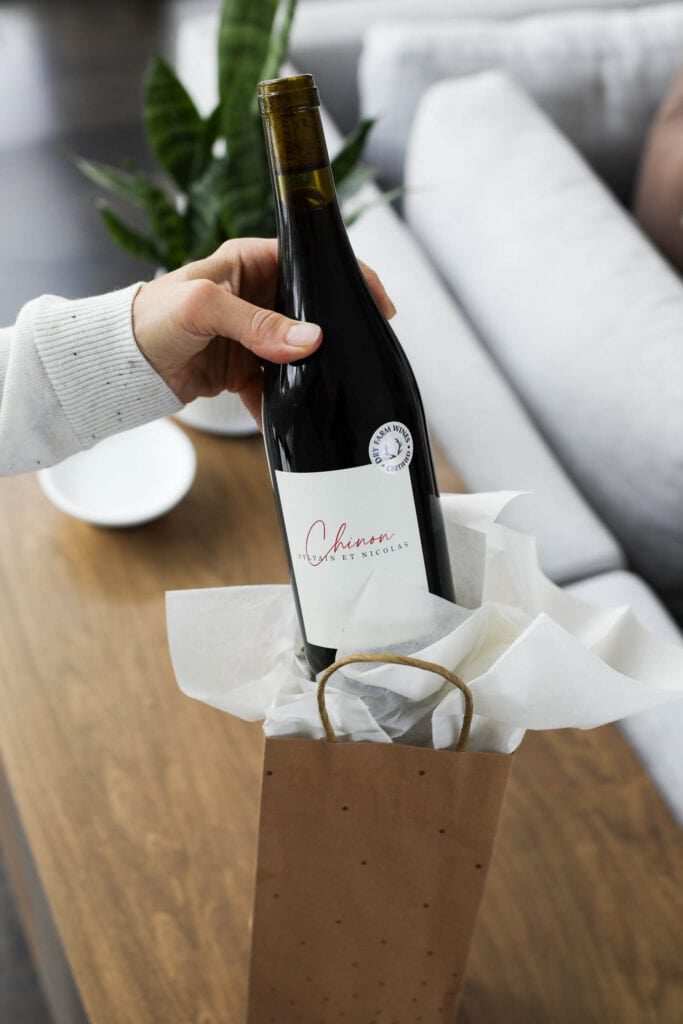
Are Dry Farm Wines Healthier Than Regular Wine?
In our research about better wines, we were surprised to learn that most wines are highly processed, just like most foods. I guess we always thought they were, as a category, a little more “natural” than that. Some other surprising stats we found:
- Over the last 40 years, the wine industry has undergone massive corporate consolidation. 3 giant wine companies sell roughly 60% of U.S. wine.
- Nearly 90% of U.S.-made wine is produced by just 25 wine companies
- There are 76 additives legally approved for use in winemaking (like dyes, thickeners, and GMO yeast) Click here for the full public list.
- Some of these additives are harmless and natural, while others are actually classified as toxic and or as health hazards by the National Institutes of Health (NIH). Two of them are considered “acute toxins.” Four of them are derived from six different animal organs. Eight of them are derived from various molds, including the mycotoxic Ochratoxin A.
- Unlike other U.S. food and beverages, wine bottles do not require a nutrition label or an ingredients label. This is because wine content is actually regulated by the Treasury Department, not by a food agency.
When you think about it, it makes sense. How can a certain brand of wine taste so consistent every time you open the bottle? It’s because most commercial wines contain unwanted additives, as well as added sugars and sulfites that help create stable, mass produced flavors. But purists would say that wine is meant to be more vibrant, special, and alive than that, let alone safer than that. It should be grown without commercial shortcuts and represent a more honest expression of the earth and climate from year to year. And though we don’t consider ourselves “wine snobs” by any means, we agree with all of these points.
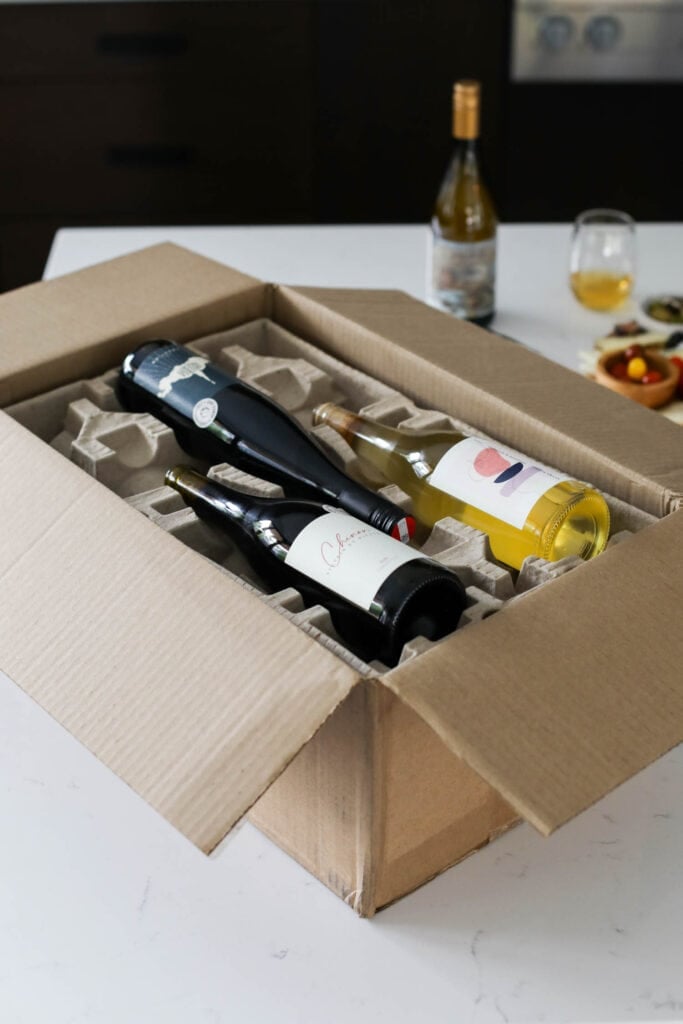
How A Small Company Is Revolutionizing The Wine Industry
Dry Farm Wines growing and sourcing can be described as “beyond natural”, even biodynamic. By setting a high bar to offer the purist wines available, the company is getting back to those special, holistic, and unadulterated characteristics that distinguish winemaking as more of an art than a science (or a little bit of both, actually). Every wine sourced by Dry Farm Wines meets these criteria:
- Organically grown by small family farms
- Independently lab tested for purity
- Sugar Free (less than 1g/L)
- Lower Alcohol (less than 12.5%)
- Free of Unwanted Additives
- Dry Farmed (Irrigation Free)
- Lower Sulfites (less than 75 parts per million)
- Fermented with wild, native yeast
- Vegan
- Ketogenic Diet and Paleo Diet Friendly
- Free of GMOs
You may be wondering how many wines actually fit this criteria. It’s a small number: less than 0.1% of the world’s wines.
Additionally, Dry Farm Wines is the first wine company to publish nutrition and ingredient information right on the bottles. Being registered dietitians who like to know exactly what’s in the foods and beverages we’re consuming, we LOVE this feature and applaud Dry Farm Wines for leading the charge
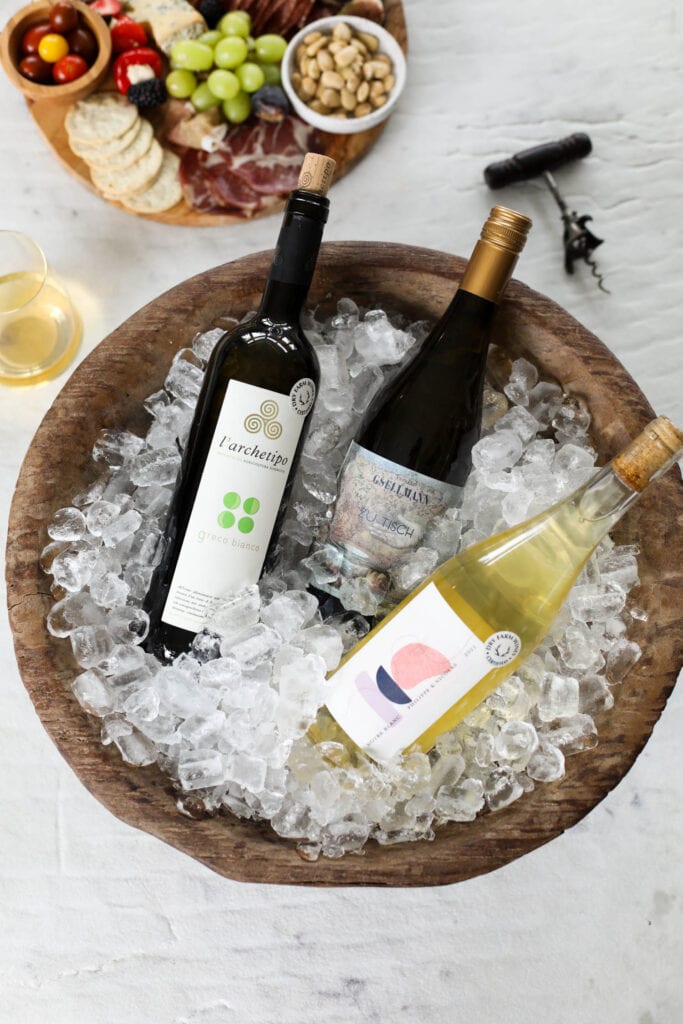
Organically Grown Wine Is Better: Here’s Why
We were shocked to learn that only 5% of global vineyards are organic. Organic farming doesn’t use synthetic pesticides and herbicides, which have a proven harmful effect on soil, waterways, and when ingested into our bodies through foods and drinks. This is very different from the processing and growing of regular wine grapes, where farming chemicals are allowed and even encouraged to increase the yield and consistency.
Winemaking does require a variety of additives to aid the fermentation process and stability of the final product. Many of the additives used in winemaking are a lot like pesticides used in farming; they are lab made chemicals that make production easier, faster, and cheaper. For instance, mass producers use what they call “fining” agents to reduce a wine’s haziness. They also use defoaming products, preservatives, and even colorants to change a wine’s color or texture. In organic winemaking only natural and organic certified additives are used. That means you have peace of mind that you’re not consuming synthetic and potentially harmful chemicals, such as sulfur dioxide and dimethyl dicarbonate, as you sip your glass of wine.
Another benefit of organic wine is that, due to the more rigorous and hands-on process of farming that doesn’t rely on synthetic fertilizers and artificial inputs, the wine tends to fetch a higher price. This means that the farmers receive a more fair and honest wage for their hard work and commitment to sustainability. Coming from a heritage of family farms ourselves, we love, applaud, and support this.
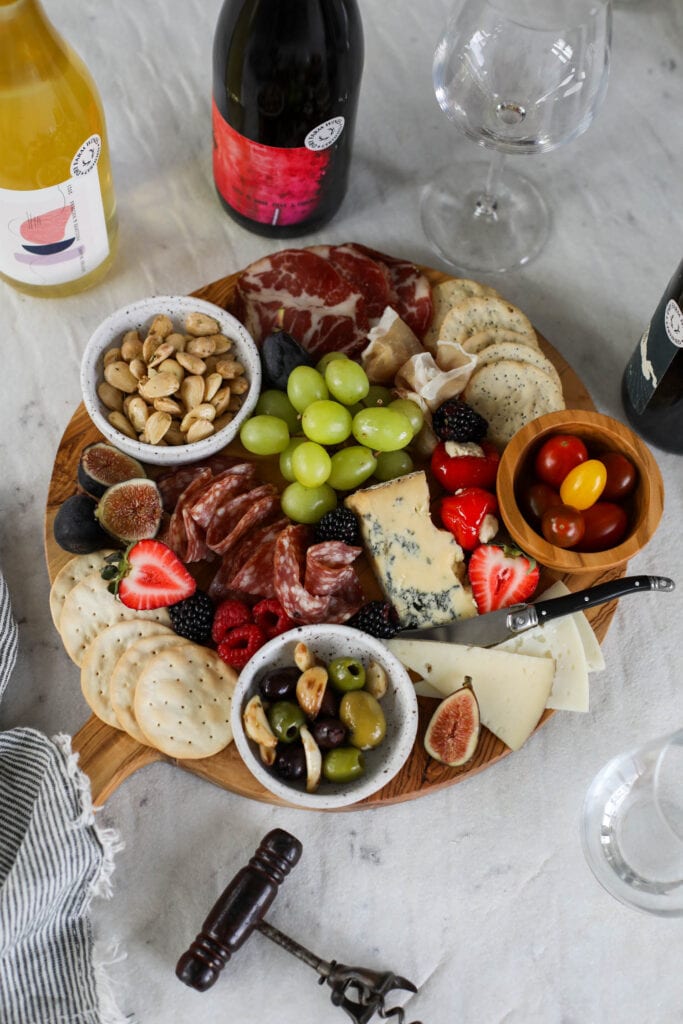
How Does Dry Farm Wines Work?
Dry Farm Wines ships wine directly to your door. You can purchase a one-time box of wines or become a member (a wine club of sorts). As a member, you can choose to have a shipment sent to you every month or every 2 months. You can also pause or cancel your membership at any time without penalty. A membership is free and members also receive the best pricing as well as free shipping. You can order boxes of 6 or 12 bottles, and choose all red, all white, or half/half (called “mixed”). They also offer rosé and sparkling wine subscriptions if those are more your style.
Dry Farm Wines curates wines from around the world. These wines must meet very specific requirements for alcohol content, low sugar content, low sulfites, and be free of toxic and unwanted additives. Also, every wine curated is grown organically on small family farms using no irrigation practices, also known as dry farming.
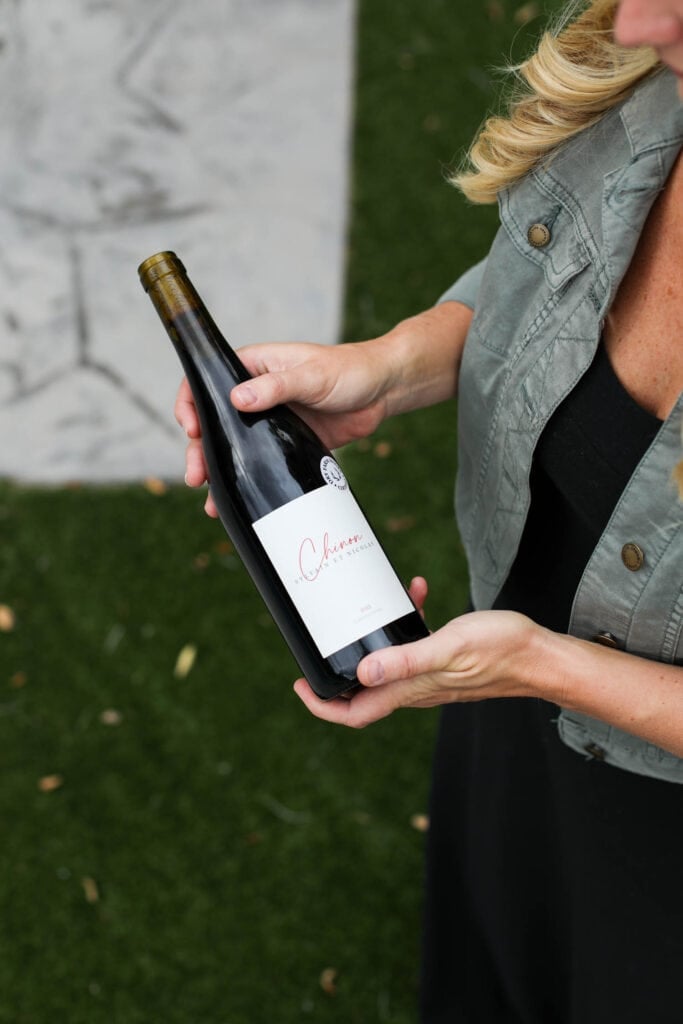
Dry Farm Wines Pricing
Here’s the pricing for Dry Farm Wines’ box options for red wine, white wine, mixed boxes, sparkling wine, and rosé. You can also purchase from a few special categories, such as Bold Reds, Pinots, and Extra Low Alcohol. Always check the website for the most up-to-date pricing.
- 6-bottle box of Reds, Whites, or Blend (half Reds, half Whites): $186 (member) or $233 (single purchase)
- 12-bottle box of Reds, Whites, or Blend (half Reds, half Whites): $352 (member) or $441 (single purchase)
- 3-bottle box of Rosé or Sparkling Wine: $103 (member) or $128 (single purchase)
- 6-bottle box of Rosé or Sparkling Wine (2 of each): $186 (member) or $233 (single purchase)
For members, the average price per bottle is $29 to $31. We consider this a great value for high-quality, low-sugar, organically grown wines sourced from the best vineyards in Europe and all around the world.
Try It And Get 1 Bottle For Just A Penny!
As a friend of ours at The Real Food Dietitians, Dry Farm Wines is offering you an extra bottle in your first box for just a penny. See the details and collect your wine at dryfarmwines.com/realfood.
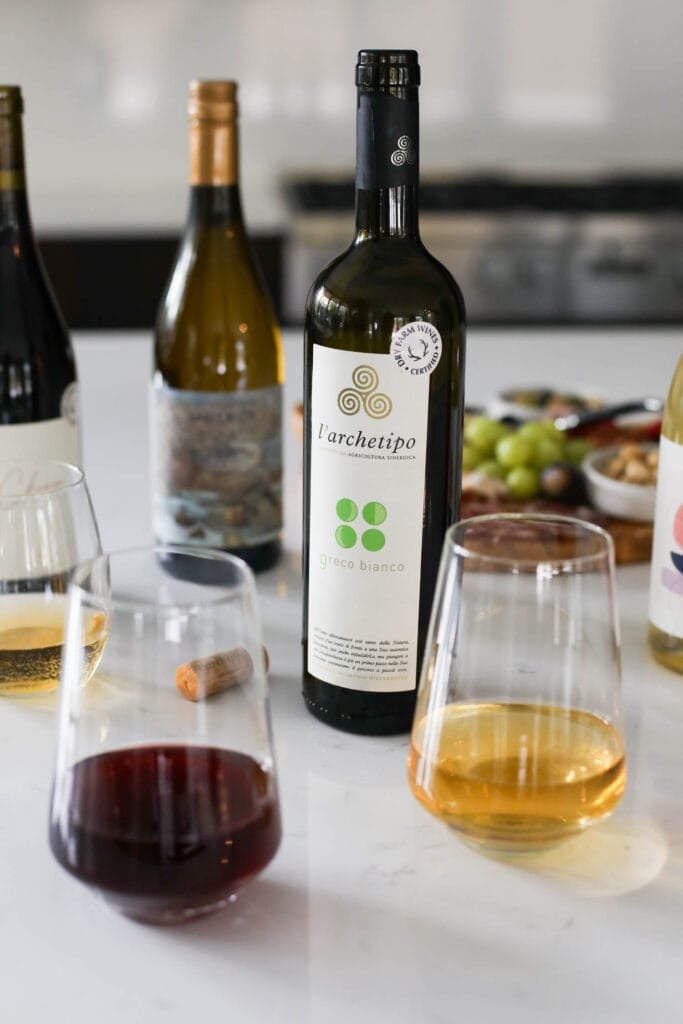
Dry Farm Wines: Special Membership Features
Members of Dry Farm Wine also have access to other features we love, including:
- Gift Boxes: The ability to send 3-bottle, 6-bottle, or 12-bottle boxes as a gift to a friend while getting the membership pricing
- Free Shipping: Members always receive free shipping whereas one-time purchases include a shipping fee
- Custom Curation Service: This is like having your own personal sommelier, free of charge. Whether you want special wines curated just for you, for a friend, or for a special event, Dry Farm Wines can curate a box that meets your unique taste profile
- Digital Gift Cards: These come in $50, $100, $186 (enough for a 6-bottle box), or $352 (enough for a 12-bottle box) increments
- Love A Bottle: If you discover a wine that you want more of, you can reorder your favorites
- Special Monthly Offers: Access to special add-on offers and early access to new releases
- Member Events: Invitation to special community events like VIP dinners
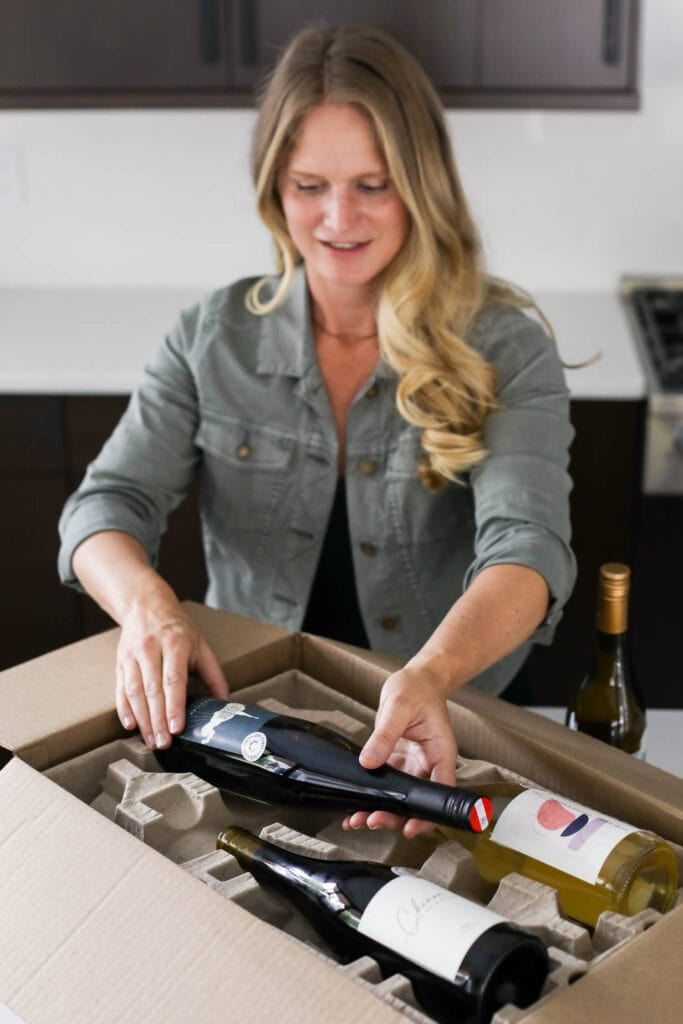
How To Buy The Natural Wines From Dry Farm Wines
The only way to get Dry Farm Wines is through the Dry Farm Wines website. You can purchase a box of wine as a member and get deliveries every month or every 2 months (pause or cancel at any time) or, you can buy it without signing up for a membership as a one-time box purchase.
Try It And Get 1 Bottle For Just A Penny!
As a friend of ours at The Real Food Dietitians, Dry Farm Wines is offering you an extra bottle in your first box for just a penny. See the details and collect your wine at dryfarmwines.com/realfood.
Who Should (And Shouldn’t) Try Dry Farm Wines
You may be wondering if Dry Farm Wines would be a good fit for you. Here’s what we think:
| It’s Probably A Good Fit If: | It’s Probably Not A Good Fit If: |
| You enjoy good wine and want to buy better wines | You don’t drink or serve wine |
| You like tasting a variety of wines | You only buy 1-2 bottles of wine a year |
| You don’t have time to specially curate good wines | You don’t have the budget for quality wine |
| You appreciate convenience and having quality products shipped right to your door | You’re pregnant or have otherwise been advised to not consume alcohol |
| You like to support organic growers, sustainable farming practices, and small family farms | |
| You appreciate all that goes into creating biodynamic wine and the dry farming process | |
| You want wines that fit in a Paleo, keto, vegan, or healthy diet |
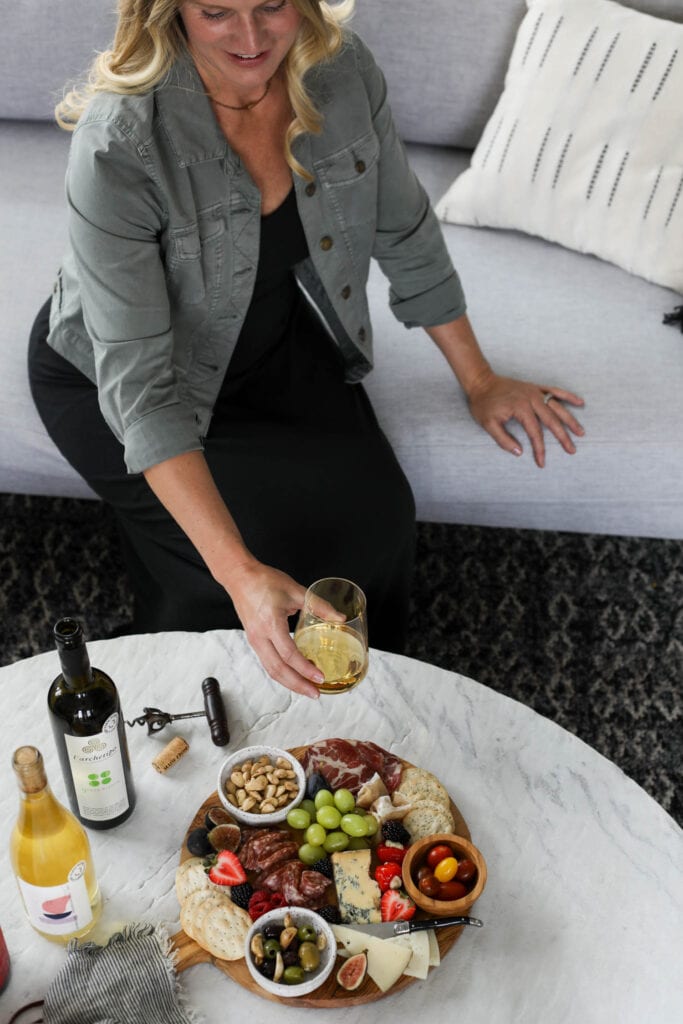
Frequently Asked Questions
Dry farming wine is made from grapes grown on a farm that doesn’t use imported water and artificial irrigation. Instead, it uses natural irrigation by harvesting the soil’s residual moisture from rainy seasons, which are reused during drier months – this method saves millions of gallons of water and other resources.
Also, Dry Farm Wines is a company that curates wine only from small family farms that organically grow grapes using dry farm methods. Their natural wines are also lower in sugar and free of toxic additives.
No, while Trader Joe’s is known by some for its wine, it’s known mainly for cheap wine (aka “three buck chuck”). Dry Farm Wines are only available directly from the company. It doesn’t distribute to stores or restaurants.
The beauty of Dry Farm Wines is that you get to taste a variety of wines in every box. The wines are all dry farmed (meaning no irrigation is used), and organically grown by small family farms from around the world. Every bottle is lab tested to verify it is sugar free (less than 1g sugar per liter), lower alcohol (12.5% alcohol or less), lower sulfites (75 parts per million or less), and fermented with wild non GMO native yeasts.
When you order a box, you can select a box of all red wines, all white wines, a mix of red wines and white wines, sparkling wines, or rose wines. You can also select wines from a few special categories, such as all “bold red” wines, all Pinot Noir wines, or all extra low alcohol wines.
The main and most obvious benefit of dry farming wine is the millions of gallons of water that are saved in the growing of the grapes. Rather than relying on irrigation and outside water imports, dry farming of the grapes relies on training the grapevines to grow very deep to find a natural water source.
Dry farming of wine grapes is more sustainable. According to Dry Farm Wines, bona fide natural wines come from organic, biodynamic farms where the farmers treat their land not as a factory for producing as many grapes as possible, but rather as a life-sustaining ecosystem.
Dry Farm Wines are sourced from around the world and only come from small family farms where the grapes are organically grown. Their wines come from many countries in Europe, including France, Italy, and Austria, as well as South Africa, Germany, Australia, the Napa Valley, and more. Dry Farm Wines prides itself on finding those “needle in a haystack” winemakers who farm sustainably using only non-irrigation methods (aka dry farming).
For members, the price per bottle averages $29 to $31. For non–members, the price per bottle averages $37 to $39.
Membership is free and has no obligations. Members can select to receive a box of wine (3, 6, or 12 bottles) every month or every other month, and can cancel or pause at any time.
Todd White is the founder and CEO of Dry Farm Wines.
The sugar content in wine varies. Red wines and dry white wines have the lowest amount of sugar, usually around 2 grams per 5 ounces, while slightly sweet wines have around 3 to 5 grams of sugar per 5 ounces. Very sweet wines, such as Sauternes, have 10 grams of wine per 5 ounces, and late-harvest wines (when the grapes are at their sweetest) can have up to 20 grams of sugar per glass.
Dry Farm Wines are virtually sugar free, containing less than 1 gram of sugar per liter. This is one of their strict criteria.
In order to be “low alcohol”, wines need to have an ABV of less than 12.5%.
Alcohol content in wine ranges from as low as 5.5% to as high as 25% ABV. Fortified wines are those that have distilled spirits added during the winemaking process, and fortified wines typically contain 15.5% to 25% ABV. Unfortified wines are those that do not contain additional alcohol that is added during winemaking. They range in ABV from 5.5% to 16% ABV.
Some of the more questionable and potentially toxic additives used in some winemaking are dimethyl dicarbonate, sulfur dioxide, ammonium phosphate, copper sulfate, polyoxythylene 40, and mycotoxic Ochratoxin A.
You may have thought wine is just made from grapes and yeast, but there’s a lot more that’s used in the winemaking process, especially in mass production. There are 72 additives approved by the FDA that can be used in winemaking. Some are natural and some aren’t.
You may be surprised to learn that no, not all wine is vegan. Some inputs used during the winemaking process are animal byproducts. These may include albumen (from egg whites), isinglass (gelatin from fish bladder), chitin (from crustacean shells), casein (milk protein), fish oil, gelatin, or bone marrow.
All Dry Farm Wines are 100% vegan and fit in a vegan lifestyle.
Yes, wine is allowed on a ketogenic diet. High-quality wines tend to be keto friendly, but wines that contain added sugar may throw you out of ketosis. Most wines, especially red wines and dry white wines, are considered low carb since they contain about 3-4 grams of carb per 5 ounces. Also, keep in mind that while wine is technically allowed on a keto diet, it does slow down the process of ketosis due to the alcohol content.
Yes, wine is allowed on a Paleo diet. Though our Paleo ancestors were not alcohol drinkers (archeologists believe man didn’t start drinking alcohol and fermented beverages until the Neolithic period, about 9,000 years ago), some people who follow a Paleo diet do drink wine. The Paleo Diet prefers organic wines because of their more clean and natural state (aka fewer overall inputs used and no synthetic inputs, such as chemical fertilizers, herbicides, and pesticides).
Keto and Paleo dieters tend to prefer wines that are organic, lower in sugar, and lower in alcohol than regular wines.
While we don’t have a discount code, we do have an excellent offer from Dry Farm Wines to extend to you. If you’d like to try Dry Farm Wines, either as a member (recommended) or as a one-time purchase, take advantage of the offer to receive an additional bottle of wine in your first box for just $0.01 through this special link: dryfarmwines.com/realfood
For ultimate success, we highly recommend reading the tips in the full blog post above. All photos and content are copyright protected. Please do not use our photos without prior written permission. If you wish to republish a recipe, please rewrite the recipe in your own unique words. Link back to the source recipe here on The Real Food Dietitians. Thank you!
This is a sponsored post. Although we received compensation for this post, the opinions expressed here are – as always – 100% our own. Thank you for supporting the great companies we work with thereby allowing us to continue creating high-quality recipes and content for you.
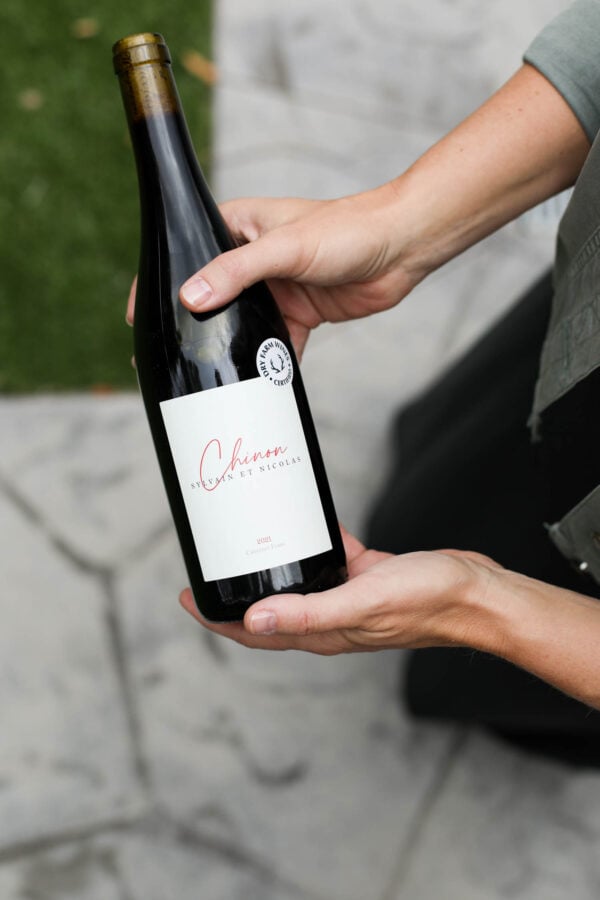
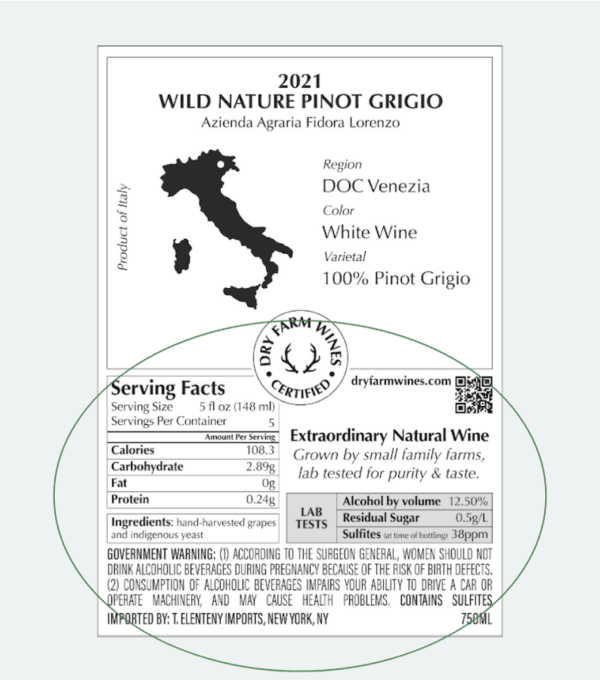
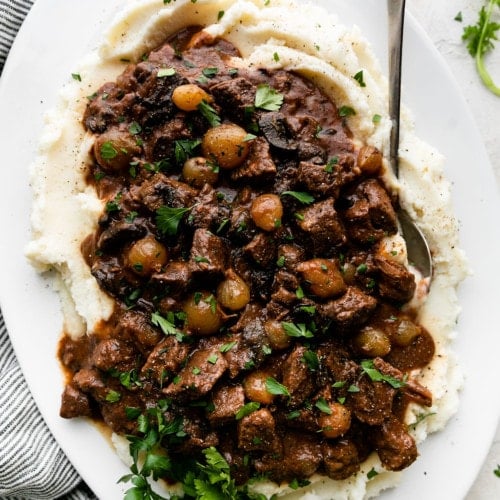

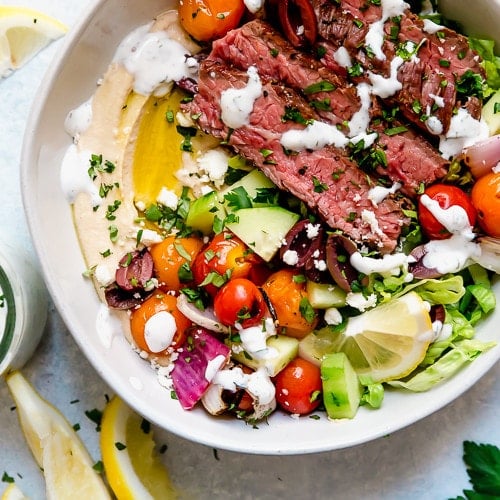
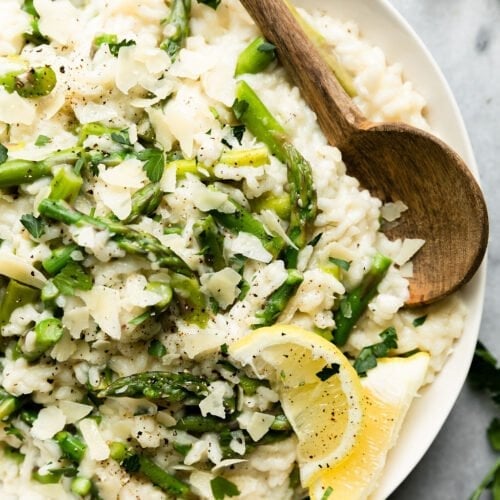
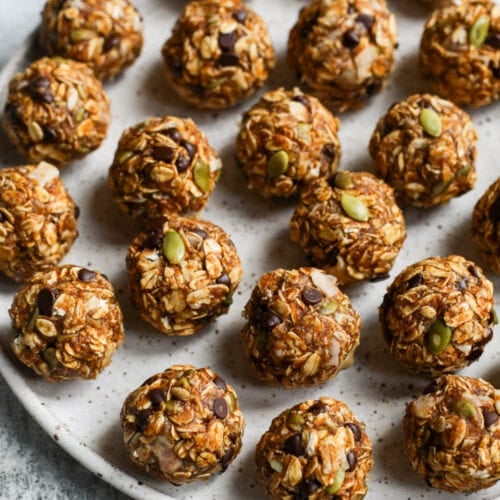
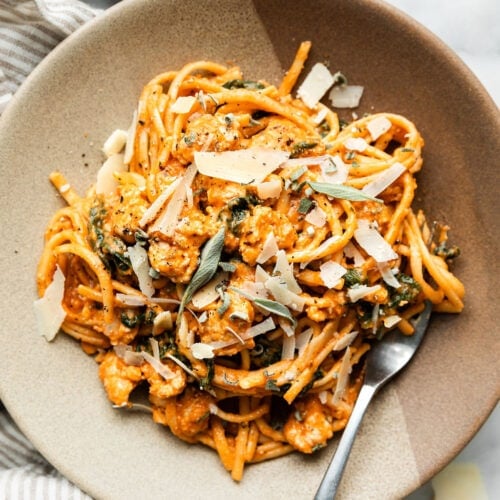
I just became a dry farms wine member this morning and ordered my first box of wine. I wasn’t told of this special offer. Is it possible for me to still be eligible for this special offer (.01 cent for a bottle?
My order # is 1815406.
Hi Sylvia! We hope you love Dry Farms Wine as much as we do. You could call their customer service at this number (707) 944-1500 and explain this issue to see if they’ll honor the offer for you.